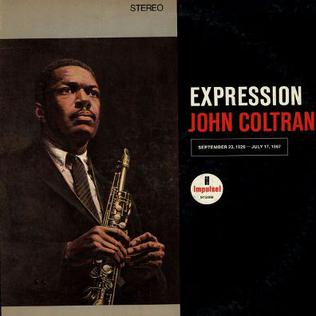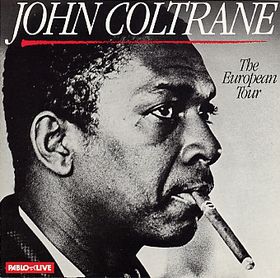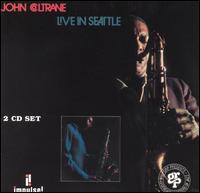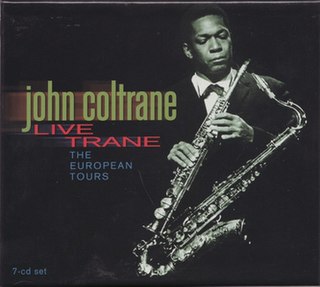
Om is a posthumously-released album by John Coltrane, recorded on October 1, 1965, one day after the recording of Live in Seattle, and one day prior to the recording of the music heard on A Love Supreme: Live in Seattle. The album, which features Coltrane's quartet plus three additional players, consists of a single 29-minute work that was split into two parts when released on LP. Om was issued by Impulse! in 1968, and was also included on The Major Works of John Coltrane, a compilation CD released in 1992.

Africa/Brass is a studio album by jazz musician John Coltrane. It was released on September 1, 1961 through Impulse! Records. The sixth release by the fledgling label and Coltrane's first for Impulse!, it features Coltrane's working quartet augmented by a larger ensemble to bring the total number of participating musicians to 21. Its big band sound, with the unusual instrumentation of French horns and euphonium, presented music very different from anything that had been associated with Coltrane to date. While critics originally gave it poor ratings, more recent jazz commentators have described it as "amazing" and as a "key work in understanding the path that John Coltrane's music took in its final phases."

Expression is an album by jazz saxophonist John Coltrane, recorded in early 1967 and released in late September of that year, around Coltrane's birthday, and two months after his death. This was the first posthumous release of a Coltrane recording, and the last album he personally authorized.

Coltrane is a studio album by jazz saxophonist, bandleader, and composer John Coltrane. It was recorded in April and June 1962, and released in July of that year through Impulse! Records. At the time, it was overlooked by the music press, but has since come to be regarded as a significant recording in Coltrane's discography. When reissued on CD, it featured a Coltrane composition dedicated to his musical influence "Big Nick" Nicholas that the saxophonist recorded for his Duke Ellington collaboration Duke Ellington & John Coltrane (1963). The composition "Tunji" was written by Coltrane in dedication to the Nigerian drummer Babatunde Olatunji.

The Major Works of John Coltrane is a compilation album by jazz musician John Coltrane, released in 1992 by GRP Records. It features extended compositions, all recorded in 1965 with expanded ensembles, and originally released by Impulse! Records on Ascension, Om, Kulu Sé Mama, and Selflessness: Featuring My Favorite Things. Both editions of Ascension are included.

Live in Stockholm 1961 is an album by featuring live performances by jazz musician John Coltrane recorded in November 1961 at the Koncerthusen, Stockholm.

The European Tour is a posthumous album by jazz musician John Coltrane released in 1980 on the Pablo label. The tracks were recorded on October 22, 1963 at the Koncerthuset in Stockholm, Sweden during a two-week European tour which was produced by Norman Granz, and which included concerts in Oslo, Helsinki, Amsterdam, Milan, Kaiserslautern, Frankfurt/Main, Paris, Berlin, Munich, and Stuttgart. Additional tracks from the Stockholm and Berlin concerts appear on Afro Blue Impressions. Tracks from Stockholm, Berlin, Paris, and Stuttgart are featured on the 2001 Pablo compilation Live Trane: The European Tours.

The John Coltrane Quartet Plays is an album by jazz musician John Coltrane, recorded in February and May 1965, shortly after the release of A Love Supreme.

Kulu Sé Mama is an album by jazz musician John Coltrane. Recorded during 1965, it was released in January 1967 as Impulse! A-9106, and was the last album released during Coltrane's lifetime.

Live in Seattle is a live double album by jazz saxophonist John Coltrane, recorded in 1965 and released posthumously in 1971 on the Impulse! label. The album consists of a set played by Coltrane's quartet at The Penthouse on September 30, 1965. Along with the later-released A Love Supreme: Live in Seattle, recorded two days later at the same club, they are the only officially released live recordings of Coltrane's six-piece lineup from late 1965. The original double LP issue was expanded to 2 CDs for the reissue.

Live in Paris is an album by jazz musician John Coltrane originally issued as 2 separate volumes in 1974 by BYG Japan and later reissued on CD by Charly Records.

Live in Antibes is a live album by jazz musician John Coltrane that was released in 1988 on the France's Concert label.

Selflessness Featuring My Favorite Things is a posthumous album by jazz musician John Coltrane, released in 1969. The album juxtaposes two tracks recorded live at the 1963 Newport Jazz Festival with a single track ("Selflessness") recorded in a studio in Los Angeles in 1965.

Cosmic Music is a jazz album by John Coltrane and Alice Coltrane released after John Coltrane's death. John Coltrane only plays on two tracks, "Manifestation" and "Reverend King".
"26-2" is a musical composition written by American jazz musician John Coltrane. The song was recorded by Coltrane in 1960, but it released ten years later by Atlantic Records on an album entitled The Coltrane Legacy with a rhythm section composed of McCoy Tyner on piano, Steve Davis on bass, and Elvin Jones on drums. The composition itself is a contrafact of Charlie Parker's tune "Confirmation", with harmonic alterations to the original chord changes used by Coltrane in a number of his compositions. This harmonic modification is commonly known as Coltrane Changes, which have been most notably used in Coltrane's "Giant Steps". "26-2" is one of several contrafacts by Coltrane, others including "Countdown", a contrafact of Miles Davis's "Tune Up"; and "Satellite" from the album Coltrane's Sound, which is based upon the chord progression of "How High the Moon". Coltrane plays the first statement of the melody on tenor saxophone and switches to soprano saxophone for the last statement of the melody on the recorded version.

Donald Rafael Garrett was an American jazz multi-instrumentalist who played double-bass, clarinet, and flute.

My Favorite Things: Coltrane at Newport is a compilation album by jazz musician John Coltrane released by Impulse! in 2007. It brings together tracks from performances by Coltrane's quartet at the Newport Jazz Festival in Newport, Rhode Island on July 7, 1963, and July 2, 1965.

Dear Old Stockholm is a compilation album by jazz musician John Coltrane released by GRP and Impulse! in 1993. The music, which was recorded on April 29, 1963 and May 26, 1965 at Van Gelder Studio in Englewood Cliffs, NJ, features Coltrane's quartet with Roy Haynes substituting for Elvin Jones on drums.

Live Trane: The European Tours is a 7–CD compilation album by American saxophonist John Coltrane containing music recorded live during 1961, 1962, and 1963 European tours, all of which took place under the auspices of Norman Granz's Jazz at the Philharmonic programs. The album, which was released in 2001 by Pablo Records, features Coltrane on tenor and soprano saxophones along with pianist McCoy Tyner, bassists Jimmy Garrison and Reggie Workman, and drummer Elvin Jones. In addition, Eric Dolphy is heard on alto saxophone, bass clarinet, and flute on a number of tracks.

So Many Things: The European Tour 1961 is a 4–CD compilation album by American saxophonist John Coltrane containing music recorded live during the 1961 European tour, which took place under the auspices of Norman Granz's Jazz at the Philharmonic programs. The album, which features Coltrane on tenor and soprano saxophones along with multi-instrumentalist Eric Dolphy, pianist McCoy Tyner, bassist Reggie Workman, and drummer Elvin Jones, was released in 2015 by Acrobat Music.


















